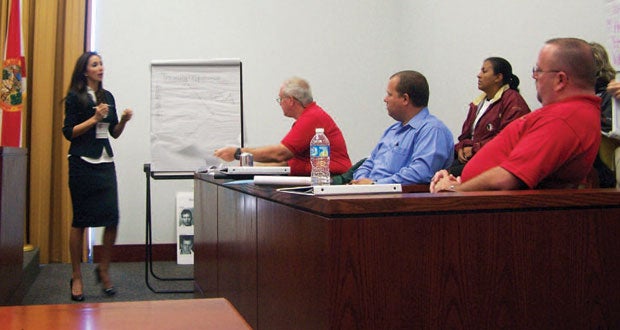
Deputies Get Tips on Courtroom Testifying
The Shreveport Times
By Vickie Welborn.
MANSFIELD, LA – Michelle V. Santamaria’s business card states, “Because it isn’t over after the arrest.”
And that’s the approach she takes when leading law enforcement officers through an interactive, day-long class on the do’s, don’ts and everything in between when it comes to testifying on their cases, whether a traffic citation or homicide investigation, in a courtroom before a judge and jury.
Santamaria pulled upon her experience as a prosecutor in Palm Beach Co., Fla., and drew information from defense attorneys and judges when creating her class on Testifying Made Simple. “It’s all of the things we wish (law enforcement officers) knew on the stand.”
The DeSoto Parish Sheriff’s Office footed the bill for the two one-day sessions, which was opened up to area agencies, after Sheriff Rodney Arbuckle realized many of his deputies had little experience on the witness stand.
“I saw some of the deputies officers testify and it wasn’t something I was satisfied with,” Arbuckle said. “Making an arrest is one thing but getting a conviction is the final part of the process. … And from feedback I’ve gotten, most of the officers said this will help them tremendously.”
Santamaria put the 80 lawmen – representing the DeSoto, Caddo, Red River and Sabine sheriffs’ offices and Stonewall police – through question-and-answer scenarios and critiqued their responses. Tips such as making eye contact with the jury, sitting up straight and voice projection add to an officer’s professionalism on the stand, she said.
“They are taught how to shoot a gun. They are taught how to collect evidence … but there’s little training on public speaking and what takes place in the courtroom,” Santamaria said. “You can lose a case by what you say and don’t say.”
She also explained how to counter “tricks” used by defense attorneys to elicit more information than is needed. Silence, she said, is the best response after questions are answered.
“The main thing I learned was to be prepared, know your case, your victim, your witnesses and your suspects and for goodness sake know your report,” said DeSoto sheriff’s Sgt. Garland Hensley, who estimates she’s only been called on about three times in her 10-year career in DeSoto and Caddo to testify in court.
Santamaria said her goal was to teach the officers what to expect. “I think the biggest hurdle is fear; fear of the unknown. If they know what to expect then they will be more confident in front of a jury. … Knowledge is power.”
